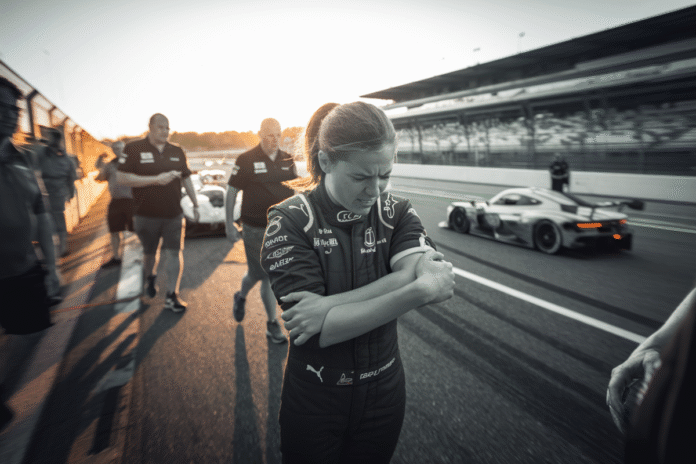Alice Buckley, a rising star in the TA2 Muscle Car Series, will not be participating in this weekend’s highly anticipated round at Mallala. This absence comes as a result of a freak injury she sustained during a recent event at The Bend. Injuries in motorsport can often have significant implications, not only for the athletes but also for their teams and sponsors. Buckley’s situation raises questions about the risks involved in high-speed racing and the physical toll it takes on drivers. As fans eagerly await her return, they are left to ponder how such incidents can alter the dynamics of a competitive series.
The stakes are particularly high for Buckley, who has been making a name for herself in the racing community. Missing a race can impact her standings in the series and affect her team’s overall performance. Furthermore, her absence may influence sponsorship opportunities and the support she receives moving forward. As she focuses on recovery, the motorsport world watches closely, hoping for her swift return to the track. With each passing race, the question remains: how will this injury shape her future in the series?
The Impact of Injuries in Motorsport
Injuries in motorsport are not uncommon, but their consequences can be far-reaching. For drivers like Alice Buckley, a single incident can disrupt not only their season but also their career trajectory. The physical demands of racing require athletes to be in peak condition, and any setback can hinder their competitive edge. This reality highlights the importance of safety measures and medical support within the sport. As Buckley recovers, the focus will be on the protocols in place to protect drivers from such unpredictable injuries.
Statistics reveal that motorsport injuries can range from minor to life-altering. The severity of these injuries often depends on various factors, including the type of racing and the safety features of the vehicles. For instance, advanced safety technologies, such as HANS devices and reinforced cockpits, have significantly reduced the risk of serious injuries. However, as Buckley’s case demonstrates, even the most prepared drivers can face unexpected challenges. This incident serves as a reminder of the inherent dangers in motorsport and the ongoing need for improvements in safety standards.
The implications of Buckley’s injury extend beyond her personal recovery. Teams must adapt their strategies, and sponsors may reassess their commitments based on her performance and availability. This situation underscores the interconnected nature of motorsport, where one driver’s misfortune can ripple through the entire ecosystem. As Buckley heals, her team will likely be strategizing how to maintain competitive momentum in her absence, which can be a daunting task in a fast-paced series like TA2.
Recovery and Rehabilitation
Recovery from a racing injury is a meticulous process that requires both physical and mental strength. For Alice Buckley, the journey back to the track will involve a comprehensive rehabilitation program tailored to her specific needs. This process typically includes physical therapy, strength training, and gradual exposure to racing conditions. The goal is not only to heal but to ensure that she returns to competition at full capacity, ready to face the challenges ahead.
Professional athletes often work closely with medical teams to develop recovery plans that prioritize their long-term health. In Buckley’s case, this may involve consultations with sports medicine specialists and physiotherapists who understand the unique demands of motorsport. The psychological aspect of recovery is equally important, as athletes must rebuild confidence in their abilities after an injury. Buckley’s resilience will be tested as she navigates this challenging phase, but her determination to return to racing remains a driving force.
The timeline for recovery can vary significantly based on the nature of the injury. While some athletes may bounce back quickly, others may face prolonged rehabilitation periods. Buckley’s situation will likely be monitored closely by her team and fans alike. As she progresses, updates on her recovery will be essential in maintaining engagement with her supporters and ensuring that her return is celebrated within the racing community.
The Future of Alice Buckley in Racing
As Alice Buckley focuses on her recovery, discussions about her future in the TA2 Muscle Car Series are inevitable. The racing landscape is dynamic, and the time away from competition can impact a driver’s trajectory. However, Buckley’s talent and determination suggest a promising future once she returns. The support from her team and fans will play a crucial role in her reintegration into the competitive environment.
In the world of motorsport, comebacks are often celebrated, and many drivers have successfully returned from injuries to achieve remarkable feats. Buckley’s case could serve as an inspiration for aspiring racers, demonstrating that setbacks can be overcome with perseverance and dedication. Her journey back to the track will be closely followed, and her performance upon return will be a testament to her resilience.
Ultimately, the experience gained during her time away from racing may also provide Buckley with a new perspective on her career. The lessons learned during recovery can influence her approach to future races, potentially making her a more strategic and focused competitor. As the motorsport community awaits her return, the anticipation builds for what lies ahead in her racing journey.


